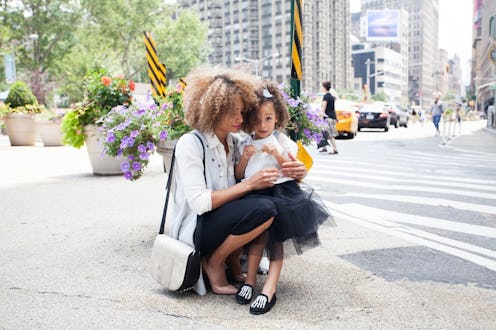Life
7 Things Millennial Parents Will Do Differently

It's happening: Millennials are becoming parents, and given that Millennials want different things than Baby Boomers, it's likely that they're going to approach/are approaching parenting very differently too. Most of us probably have parents who are considered Baby Boomers. That generation of people who, raised in a post-war culture under the auspices of the threatening Cold War, worked hard for education, financial security, tangible assets and who by and large rejected the traditional values of their parents before them, raised many a Millennial.
But for Millennials, financial security seems like a thing of the past. We jump from job to job, many of us saddled with crippling college debt, and most of us realizing that unlike our parents, we might never actually own that lovely big house in the suburbs. Millennials, in some ways, are more open-minded than Baby Boomers, and while we've been accused of blind privilege and narcissism, Millennials also have a strong sense of community responsibility and a strong liberal lean when it comes to human freedoms. All these, of course, are generalizations drawn from various sociological and economic studied, but (in a very general way) tend to be blanket truths. As such, here are some of the ways Millennial parents will raise their children differently.
1. They Won't Use TV As A Babysitter
This isn't a slight on Baby Boomer parents at all, but it's a fact that the television set, traditionally, has been the focal point of the family home. As many Millennials identify as "cord cutters", there's been a shift away from the idea that the television, at the center of the room, will always be on. Millennials tend to curate their television and watching with various apps, and it seems that their children will have a similarly curated allowance when it comes time to watch the screen.
2. They Will Promote Tolerance
Millennials, to their credit, are probably the most open-minded and tolerant generation yet. Whereas even Baby Boomer parents who were, for the time, quite radical in their beliefs, might still have conservative views on things like same-sex marriage, Millennials are more likely to promote tolerance on a wide range of issues to their children.
3. But Downplay Property Ownership
Most Millennials have either come to terms that they might never own a house, or flat out aren't interested in owning a house. As such, less emphasis will be put on property ownership than was by their home-owning Baby Boomer parents.
4. They Might Not Adhere To Ideals Of A Traditional Nuclear Family
Millennials are waiting longer to have children, and aren't married to traditional things like, well, marriage. Not all millennial families will represent, or strive to represent, the traditional nuclear family, and parents won't stick to their arbitrarily assigned roles. Families will come in all shapes and sizes, and parental roles will be more fluid than ever.
5. They'll Probably Make Their Kids Figure Out College Tuition On Their Own
Did I mention crippling debt and financial instability yet? Millennials are facing a massive income downturn in comparison with their parents, and paying for their children's college tuition might not be as feasible. It's likely as a result that Millennial parents will put greater stock in early employment and learning skills and trades rather than following a traditional college path. This might especially be the case for Millennials with liberal arts degrees who haven't seen a correlation between fees and post-collegiate income.
6. They Will Promote Health And Nutrition
Millennials might not have any money, but they're more health and nutrition focused than society portrays them, which they'll impart on their children. Also, this doesn't bode well financially, because being so healthy they'll probably live longer, and with less money in the kitty.
7. More Moms Will Likely Stay In The Workforce
Defaulting to "stay at home mom" is a thing of the past. Sure, some Millennials will opt to do so, but it's likely that more and more moms will be working mothers. Career, for women, is more important than it has been in the past — and not just because we can, but because we want to, and because there's a distinct cultural push to prove that women can actually "have it all".